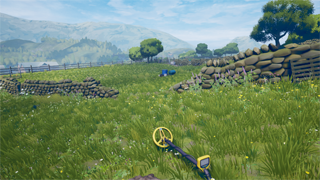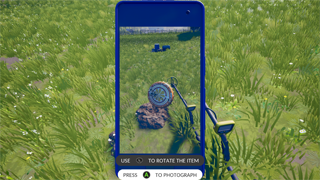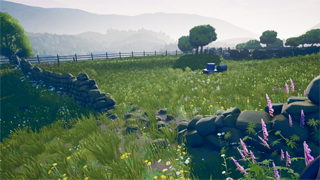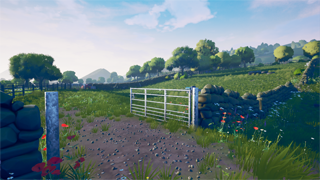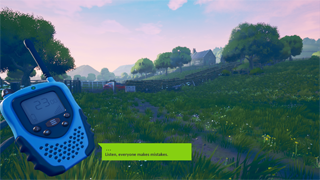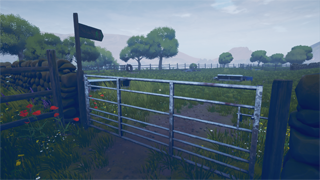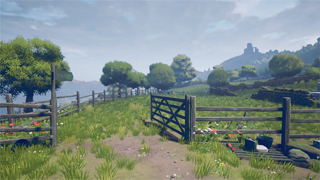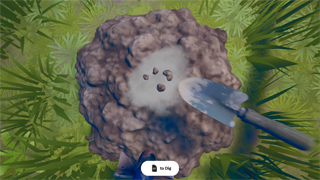
Role: Director, Writer, Designer
Platforms: PC / Nintendo Switch
Developer: Thunkd
Publisher: AMC Games
Released: 2021
Overview
The Magnificent Trufflepigs is a first-person, metal-detecting game. You play as Adam, a sharp-witted but compassionate man returning to his childhood village of Stanning. There he’ll help a woman named Beth on her mission to unearth a local treasure.
As cracks begin to appear in Beth’s fairy tale plan for everything, you’ll delve into her history and discover all may not be as it seems. And you’ll have to choose how Adam responds to Beth as she faces her demons.
Gameplay combines laid-back metal detecting and exploration with a strong interpersonal narrative, all set in a beautiful English
countryside. The Magnificent Trufflepigs is a game about trying to find something, and the tone it sets is like a typical English
summer: mostly pleasant, but with stormy moments that threaten to ruin everything.
Starring Arthur Darvill (Doctor Who, DC’s Legends of Tomorrow) as Adam and Luci Fish (Safe House, Another Eden) as Beth.
Metal detecting!
In this game you will meditatively explore a peaceful English farm, finding “treasures” (mostly rubbish) with your detector. After digging
something up, you can sharing photos of your finds with Beth.
Relationship building!
The player can chat with Beth via walkie-talkie and instant message, slowly unravelling a mystery through interesting narrative choices. As
the game proceeds, you’ll learn about Beth’s hopes and fears and direct the conversation to root out the truth.
Images
Videos
Notes
The Magnificent Trufflepigs was the first game made by my own studio "Thunkd".
I'd spent the best part of a year making prototypes, and although many of them showed promise, they were far too ambitious in scope. I realised that I'd probably run out of money before any of them were ready to pitch to publishers, and so I started on a smaller idea, that eventually evolved into Trufflepigs.
The game was inspired by a BBC light-comedy/drama about a pair of detectorists. I really enjoyed the slow pace, and the opportunities that strolling through idyllic fields gave people to chat. The relationship between the lead characters - Adam and Beth - took a while to nail down, and several drafts were written to explore different dynamics (note: they're called Adam and Beth because I wrote a handful of experimental drafts with different male/female role configurations, including Adam/Ben, Beth/Amy - I was literally A/B testing!).
Trufflepigs was made with a tiny team. I was the only full-time person. I built the playable demo by myself, and managed to get a publishing deal. Sadly the 'game beyond the prototype' - which would have been bigger, with more varied exploration and activities, and generally more ambitious - never materialised. We parted ways with our original publishers at the same time that Covid kicked in, but were fortunate enough to hook up with AMC Games, who funded the game's completion and helped us to release on PC and Nintendo Switch.
[Warning: these notes include spoilers from this point] The writing process took some time. It started off as a boy-meets-girl romance, but gradually I came to terms with the fact that there were large parts of the story that were semi-autobiographical. Once I'd accepted this, the narrative clicked into place. Like most people I have emotional lows and highs. When I hit low points I find I tend not to talk to people as much - at the very time I should be talking more. The mechanism I've developed to deal with this is to increase my "inner speech". By processing lots of imagined conversations I start to think differently about situations, people, and relationships. Eventually I'll arrive at a point where I feel that I've either understood a different point of view, or discovered it's my own approach or stance I need to change.
To a greater or lesser extent, this is something we all do; play through scenarios and conversations in our heads. We start, as young children, by doing this aloud. Parents often refer to this as an imaginary friend. We quickly learn to internalise this voice (for good reason!). Some people (like Agatha Christie) embrace the idea of the inner voice, and imagine it a constant companion; a tool to fall back on whenever it's required. And this is what Beth does with Adam.
The problem is, media, especially movies, have used the inner voice/imaginary friend trope as a sign of mental illness. Of course, hearing uninvited voices, and being unable to control those voices can be a sign of a condition that needs exploring. In Trufflepigs we make it clear that Beth invited these conversations, and is always aware that she is in control. At one stage of development the player/Adam's choices were going to affect the outcome of the game, but we ditched that idea so that it was clear that it was always Beth determining her destiny and not Adam (as her imagined friend). Towards the end of the game, when many players had already seen the clues and realised that Adam wasn't real, we hear Beth and Adam acknowledging the role that Adam plays, as proof that Beth is fine, and in control. She's just dealing with her life in her own way.
Beth goes from not talking to family and friends, and resenting her life choices, to reconnecting with those close to her and planning a path to happiness. But even with these huge signs in place, we were still concerned that some people might jump to the conclusion that Beth had deeper, mental issues. The other thing we did to try and guide people away from this conclusion was to litter the game with examples of people coming to the wrong conclusion about scenarios due to our instinct to expect the worst, and for everything to have a dark and disturbing outcome. Amongst other things, we discover that UFOs did not visit Stanning, and that the farmer's wife and child did not meet a grisly end.



